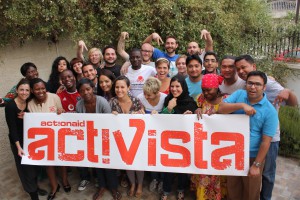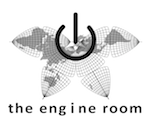This post, by Maria Grabowski, was originally published by the engine room.
This is the first in a series of posts to profile resources that are featured in the Social Tech Census. The engine room’s Social Tech Census is an online, searchable database of support for advocates around the globe looking to make better use of digital media and mobile phones. The Social Tech Census identifies a variety of resources for the use of technology in advocacy.
Activista is a global youth network using creative and global campaigning to mobilize young people around issues like tax justice, land grabbing and making cities safe for women and girls. The Activista network is hosted by ActionAid, but the driving force is thousands of volunteers in over 20 countries. Using social media and other tools, it is also a space for global discussions amongst activists to improve capacity to organise and mobilise youth.

Activista started in 2007 with the simple idea of coordinating and arranging local concerts during a larger ActionAid campaign. The idea soon evolved into a community, later a brand, and then an activist-identity connected through a global network.
Søren Warburg is the International Activista Coordinator, based in Copenhagen, Denmark. He explains that the whole creation process of Activista seemed to start backwards: “Usually you have a strategy, and then you create a structure to follow – in this case, it was the other way around. We already had the structure, and then made a strategy to make the best of it.” He describes Activista’s current tripartite ‘Critical Pathway’: “The first goal is to create a space for young people to take part in our multi-country campaigns. The second is to create 30 functional national networks before 2017, and the third is to build up decentral communication platforms.”
26 countries have active Activista groups, engaging up to 200-300 core volunteers in each group. Another 2-300 ‘hangarounds’ participate in local Activista activities – but this is a wild guess: participation is loose and because “you don’t have to be a member or register to be involved in Activista…it is not really possible to count all active participants”. Official groups currently exist in: South Africa, Kenya, Uganda, Nigeria, Gambia, Senegal, Sierra Leone, Zambia, Nepal, Myanmar/Burma, Bangladesh, Denmark, United Kingdom, USA, Greece, Brazil, El Salvador, Honduras, Nicaragua, Jordan, Egypt, Lebanon, Thailand, Pakistan, Afghanistan and Liberia.
An ongoing Activista project is the tax justice campaign. The campaign will launch the first week of July, and “activistas” around the world will be taking photos of themselves with personal messages about the positive aspects of paying tax – what tax pays for, and why multinational corporations need to pay up. The photos will be posted online through #taxpaysfor to create build momentum for a global campaign and movement.
Six Questions from the engine room
1. How do I find Activista?
Through local activities and alliances with other local youth movements and networks – e.g. our local rights programs. We’re often contacted locally by young, already engaged and outreaching people. We coordinate online, but our practice is mainly offline.
2. How do I engage in Activista?
People engage at all levels. Some people just show up and support when we have local arrangements and street actions. People that wish for more responsibility, can easily get it. We call the most active ‘core volunteers’.
3. What kind of resources do you offer?
Besides a few online guides to campaigning, we exist within ActionAid which offers national and international trainings – e.g. Global Change and Youth Leaderships courses (fees are often covered by grants). People often bring back their new skills to their local environment and pass on the training for free. In some countries we have experienced that people don’t see themselves as ‘real Activistas’ until after participating in a training. Activista has some places become a brand and an identity of a trained activist.
4. What are your biggest challenges?
That we’re global! Our span – from global strategies to local issues – is both the strength and challenge of Activista. The international clout helps bringing forward local agendas, but in that very process day-to-day practical details as Skype connections, Internet, basic tech skills all tend to slow down the work.
5. What possibilities do you see in using tech for supporting and mobilizing civil society?
Recognizing that young people are considerably connected and find information online and through social media, we are very dedicated in piloting new ways of using digital and online technologies in mobilizing young people – we also recognize that different technologies are being used in different context, e.g. mobile phone technologies are crucial in parts of Africa, where twitter and facebook might be the hot spot in Europe or Asia.
6. How may the Social Tech Census be useful for you in your work?
In profiling Activista among other youth campaigning networks and seeking opportunities for joint projects and building alliances with other youth movements and organisations.
Learn more about Activista
- Find them on the Social Tech Census
- Their Website
- Mail: activista.international [at] actionaid.org
For questions or comments about the Social Tech Census, please email the project address: resources [at] socialtechcensus.org or comment on this post.




2 comments